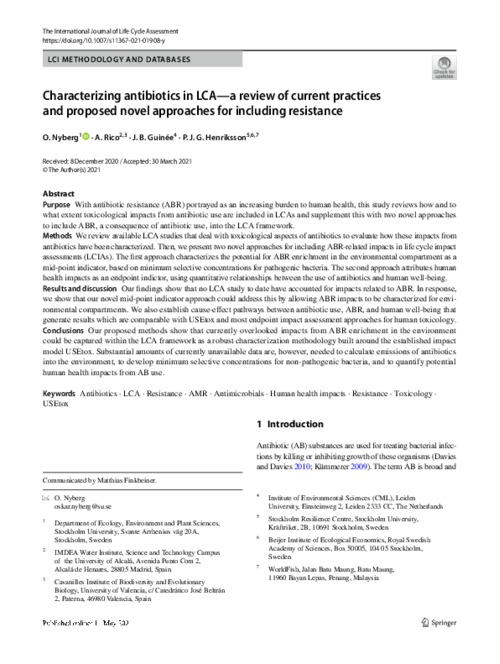Characterizing antibiotics in LCA—a review of current practices and proposed novel approaches for including resistance

Purpose
With antibiotic resistance (ABR) portrayed as an increasing burden to human health, this study reviews how and to what extent toxicological impacts from antibiotic use are included in LCAs and supplement this with two novel approaches to include ABR, a consequence of antibiotic use, into the LCA framework.
Methods
We review available LCA studies that deal with toxicological aspects of antibiotics to evaluate how these impacts from antibiotics have been characterized. Then, we present two novel approaches for including ABR-related impacts in life cycle impact assessments (LCIAs). The first approach characterizes the potential for ABR enrichment in the environmental compartment as a mid-point indicator, based on minimum selective concentrations for pathogenic bacteria. The second approach attributes human
health impacts as an endpoint indictor, using quantitative relationships between the use of antibiotics and human well-being.
Results and discussion
Our findings show that no LCA study to date have accounted for impacts related to ABR. In response,
we show that our novel mid-point indicator approach could address this by allowing ABR impacts to be characterized for environmental compartments. We also establish cause-efect pathways between antibiotic use, ABR, and human well-being that generate results which are comparable with USEtox and most endpoint impact assessment approaches for human toxicology.
Conclusions
Our proposed methods show that currently overlooked impacts from ABR enrichment in the environment could be captured within the LCA framework as a robust characterization methodology built around the established impact model USEtox. Substantial amounts of currently unavailable data are, however, needed to calculate emissions of antibiotics into the environment, to develop minimum selective concentrations for non-pathogenic bacteria, and to quantify potential human health impacts from AB use.
Permalink
Date Available
Type
Publisher
ISSN
1614-7502
Copyright
CC-BY-4.0
Topics
Language